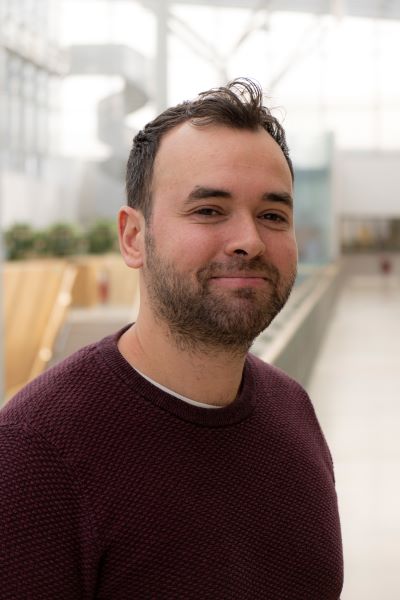Lecturer at the Royal Veterinary College wins international award for excellence in microbiology

Dr Ben Swift, Lecturer in Antimicrobial Resistance, at the Royal Veterinary College (RVC), has been named this year’s winner of the international Basil Jarvis Prize for his significant contribution to food safety, food fermentations and food security. This is thanks to the improvements he has made to diagnostic tests for mycobacterial infections in animals and humans. The prize is part of the Applied Microbiology International Awards, which celebrate the brightest minds in the field.
Dr Swift’s award was announced at the prestigious Environmental Microbiology Lecture 2023, held at BMA House in London on 16th November. Dr Swift won the award in recognition of his work as part of a team to invent and commercialise a technology that rapidly detects slow-growing mycobacteria which is responsible for diseases in cattle, such as Bovine TB and Johne’s disease. The research directly addresses one of the United Nations’ Sustainability Development Goals by providing a method to rapidly diagnose, control, reduce transmission and ultimately eliminate these diseases in cattle.
Cattle are a crucial source of both nutrition and income for people in countries with lower GPD, so livestock production losses caused by diseases have a severe impact on those suffering from hunger or malnutrition. Helping mitigate this impact, Dr Swift co-invented and successfully translated novel technology – Actiphage - that is inexpensive and can be deployed in low-income settings, which has been used to diagnose Bovine TB and Johne’s disease in cattle. The technology uses a bacterial virus (called bacteriophage) to break open the bacteria causing the infection, to release its DNA, which can then be detected using techniques such as PCR.
Dr Ben Swift, Lecturer in Antimicrobial Resistance at the RVC, said:
“The bacteria that cause these diseases are incredibly slow-growing and difficult to diagnose. Our bacteriophage technology – Actiphage – utilises the bacteriophage’s ability to efficiently infect and breakopen live mycobacteria, releasing mycobacterial DNA for molecular detection. In short, we use the bacteriophage as a viable DNA lysis reagent as a rapid, low-cost test that can be deployed worldwide. This will help to provide a more sustainable food system, increase productivity and income and reduce food waste.”
Notes to Editor
For media enquiries, please contact:
- jasmin.devivo@plmr.co.uk or rvc@plmr.co.uk
- Press Line: 0800 368 9520
About the RVC
- The Royal Veterinary College (RVC) is the UK's largest and longest established independent veterinary school and is a Member Institution of the University of London.
- It is one of the few veterinary schools in the world that hold accreditations from the RCVS in the UK (with reciprocal recognition from the AVBC for Australasia, the VCI for Ireland and the SAVC for South Africa), the EAEVE in the EU, and the AVMA in the USA and Canada.
- The RVC is ranked as the top veterinary school in the world in the QS World University Rankings by subject, 2023.
- The RVC offers undergraduate and postgraduate programmes in veterinary medicine, veterinary nursing and biological sciences.
- The RVC is a research-led institution, with 88% of its research rated as internationally excellent or world class in the Research Excellence Framework 2021.
- The RVC provides animal owners and the veterinary profession with access to expert veterinary care and advice through its teaching hospitals and first opinion practices in London and Hertfordshire.
You may also be interested in:
-
New RVC study reveals how dragonfly wings can inform engineering and robotics
A new study led by the Royal Veterinary College (RVC) and Imperial College London has revealed how …

